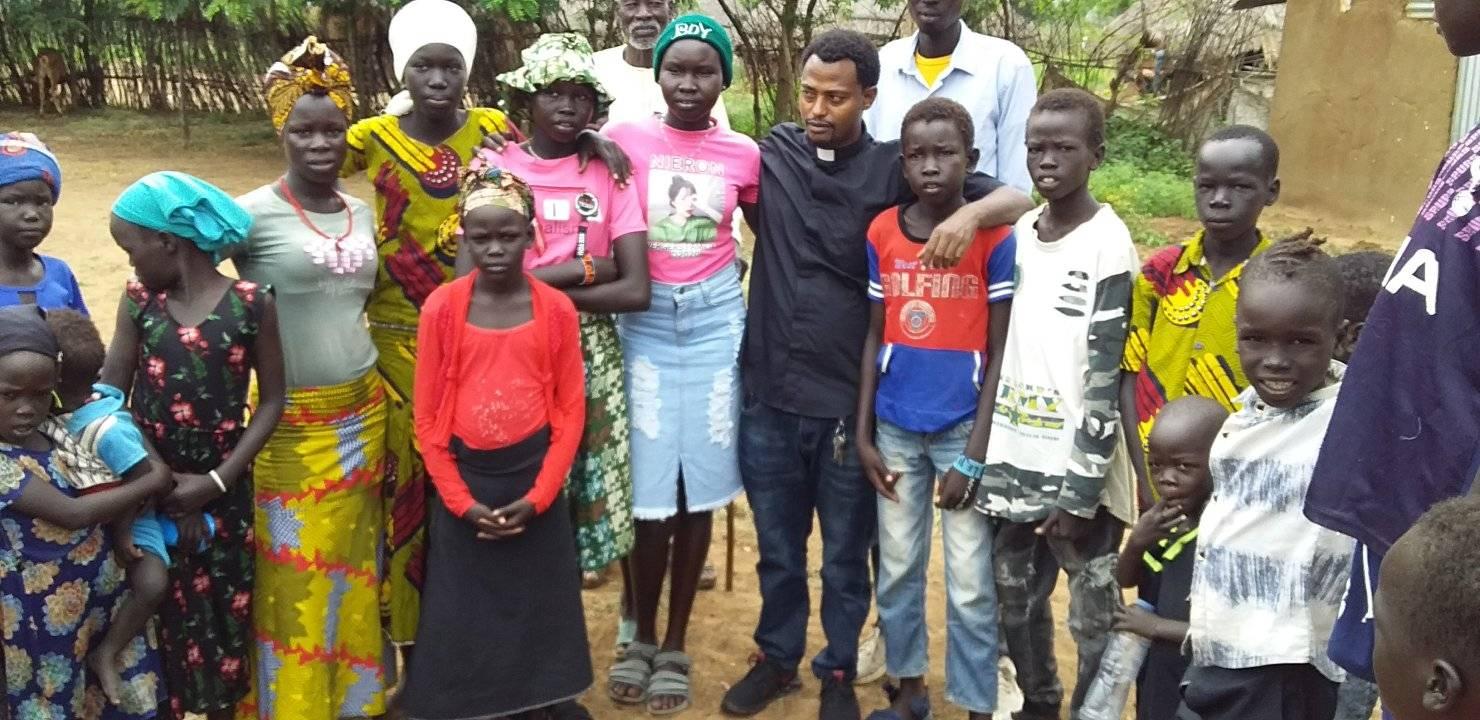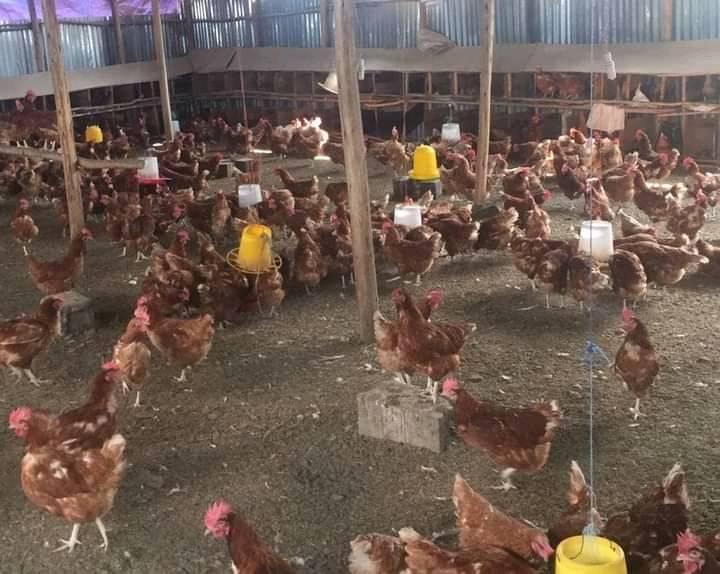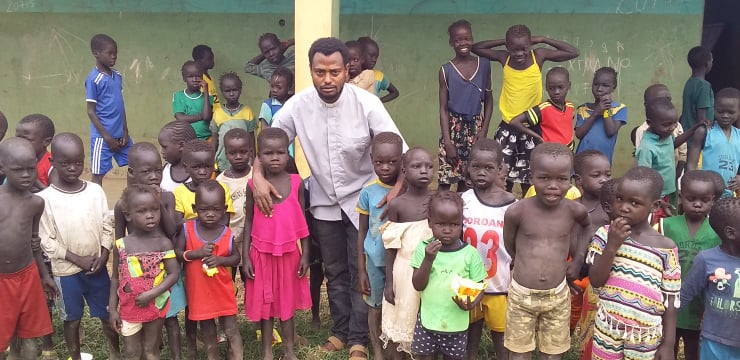Marco Carvalho
Five hundred years since it first enticed Europe, the mythical kingdom of Prester John remains deeply religious and deeply devout, and faith – whatever the rite or denomination – is still for many a undeniable sign of identity. But Ethiopia is also one of the harshest and demanding countries in terms of survival. Women are among the most vulnerable amongst the unprotected. Now, a Catholic priest in a remote region of Ethiopia wants to foster conditions to empower women facing extreme poverty. Father Abiyot Desalegn, Parish priest at Itang, near the border with South Sudan, explains how he is changing the lives of dozens of women in one of the poorest regions of the world.
You have launched a very interesting project with the purpose of empowering women in one of the harshest and unequal environments in the African continent. How do you intend to achieve this objective?
The number of poor women all over Itang parish is quite significant. We often conduct pastoral visits in the villages that are part of the parish and during those visits, we meet with poor women who are physically weak or that have been worn down by sickness. Most of them cannot manage to work in the fields. Malaria repeatedly affects them due to the lack of nutrients which make them resistant to this illness. They really need and deserve to be supported. Everybody deserves to live with dignity, to have a better life. But rather than bothering our donors every year so that we can get food for them, we changed the way we support them, promoting instead animal husbandry. This way, they can provide for themselves and, by doing that, they will feel more empowered. We are hoping that they can rely on themselves and, at least, minimize many of the problems they face.

You are trying to provide women with equal opportunities in terms of education, employment and access to production resources by allowing them to start their own small business. Who are the target of this project?
Today, more girls than ever go to school. However, despite this progress, women and girls continue to face multiple barriers. Other factors – such as age, ethnicity, poverty, and disability – affect the right to enjoy or have access to quality education.
Was the project already launched? And if so, did you manage to achieve any results?
Yes. These women are now happy and better off, both economically and psychologically. Some of them are now eating the eggs that they produce, selling the remaining eggs and there are a few that even acquired some more chickens. Things did change and we noticed some improvements.
Five hundred years ago, the perspective of discovering a Christian realm behind Muslim lines took the Portuguese to the heart of Africa. Five hundred years later, how important is Christianity in Ethiopia? Is it still part of the national identity of the nation?
Christianity is still generally considered the traditional religion of the country and it is closely correlated with the idea of national identity. For most Ethiopian Orthodox Christians, faith is deeply important to their day-to-day life, as well as an integral part of their identity.
What sort of challenges does the Catholic Church face in Ethiopia?
Let’s begin with geography. Ethiopia is a huge country that seems much larger because of its poor road systems. It takes more than four days to drive from one tip of the country to the other and this would be a very wearying trip indeed. Without heavy-duty four-wheel-drive vehicles, it is impossible to navigate. On the other hand, there are many ethnic, tribal and linguistic challenges and, so, even communication is difficult, at best, in some areas of the country. Neighboring Ethiopia are countries that have suffered and continue to suffer from war, hunger, social injustice and political oppression. Ethiopia has, herself, experienced some great famines and an ugly war with Eritrea. Families have been cruelly separated from loved ones because they were on the wrong side of a demarcation line. Refugees arrive from bordering countries every day and bring further strain to the local economy. There is a constant reliance on global organizations for clothing, foodstuffs, water, medicines and other basics. The church is very involved in partnering with these agencies in bringing needed relief to the masses of people who are poor and derelict. Ethiopia also has an interesting mix of rites: many of the dioceses are Latin and are called apostolic vicariates. Other dioceses are part of the Ge’ez Catholic rite, which is Eastern. They are called “eparchies.” Some of the bishops of one rite have actually grown up in the opposite rite. But generally, things seem to work. Most of the bishops and priests in many parts of the country are bi-ritual, and thus are comfortable in celebrating the liturgy well in either rite.

There is an ongoing conflict in the Tigray region, one more conflict in a region which has been plagued by instability. Are the echoes of this war felt in Itang town? If so, how?
The conflict between the government of Ethiopia and forces in its northern Tigray region has thrown the country into turmoil. Fighting has been going on since November, destabilizing the country, with reports of hundreds dead. A power struggle, an election and a push for political reform are among several factors that led to the crisis. This crisis didn’t affect only the Tigray region. It affected the whole country. Life in Itang became extremely expensive. There are a lot of refugees: Anyuak, Nuer, highlanders. In Itang, one of the problems is that conflict never really stopped. There was always war: no peace amongst these two tribes, the Anyuak and the Nuer. Even for people that are serving, like us, things became very difficult. We need to foster a peace building process to bring peace to Itang.
Is religious persecution an issue in Ethiopia? Can one be persecuted for being a Catholic?
In Ethiopia, persecution is often dependent on what kind of Christian you are or where you live. Because of the government’s special relationship with the Ethiopian Orthodox Church, other denominations – especially Catholic, Evangelical and Pentecostal Protestants – are persecuted by the state and by the Orthodox Church. Christians who change denominations and leave the Orthodox Church are subject to family and community pressure and can face significant mistreatment. Additionally, churches can be restricted from holding religious gatherings. The other major factor for persecution in Ethiopia is Islamic extremism, particularly in the eastern and southeastern parts of the country. Converts to Christianity from Islam can be harassed and oppressed by their families and by the surrounding communities. In some regions, Christians are denied access to community resources and experience ostracism and discrimination. Additionally, some Christians are vulnerable to violence when Islamic extremists attack churches and homes alike. Christian women face the additional risk of being forced to marry non-Christians and, then, expected to follow the religion of their husband. And if a woman converts to Christianity in a non-Christian area, it is likely she will be divorced by her husband and possibly lose custody of her children
For a priest, like yourself, what is the biggest challenge of taking care of a flock in a border region such as Itang?
One of the most pressing problems in the villages is the lack of facilities that women can use to ease their home duties. It’s painful to see women working 16 hours of a day everyday to discharge their home responsibility of taking care of their family. The region of Itang is one of the most conflict ridden regions of Ethiopia stemming from local ethnic conflict between the Anyuak and the Nuer. My biggest challenge in Itang due to this conflict is that problems start suddenly and we don’t know when or why they might happen. On the other hand, I am working around nine chapels, in nine communities, and these nine communities have no clean water, school, grinding mill, electricity, road, or clinic. The people are suffering from malaria. They have no food, no school. The life of locals and refugees alike is very difficult. The people always ask for food and for water.
Despite all this, is the Church growing in the Gambella region?
Yes, it is growing.
Is there still a place for evangelization in Ethiopia? And if so, how should this evangelization process be conducted?
There’s still space and place for evangelization, because there are still a lot of people that need our presence. Nevertheless, without financial support, it’s impossible. There are people asking me to open new churches, new chapels in at least five places. But without support, it is very difficult. (Photo courtesy of Fr Abiyot Desalegn)


 Follow
Follow


